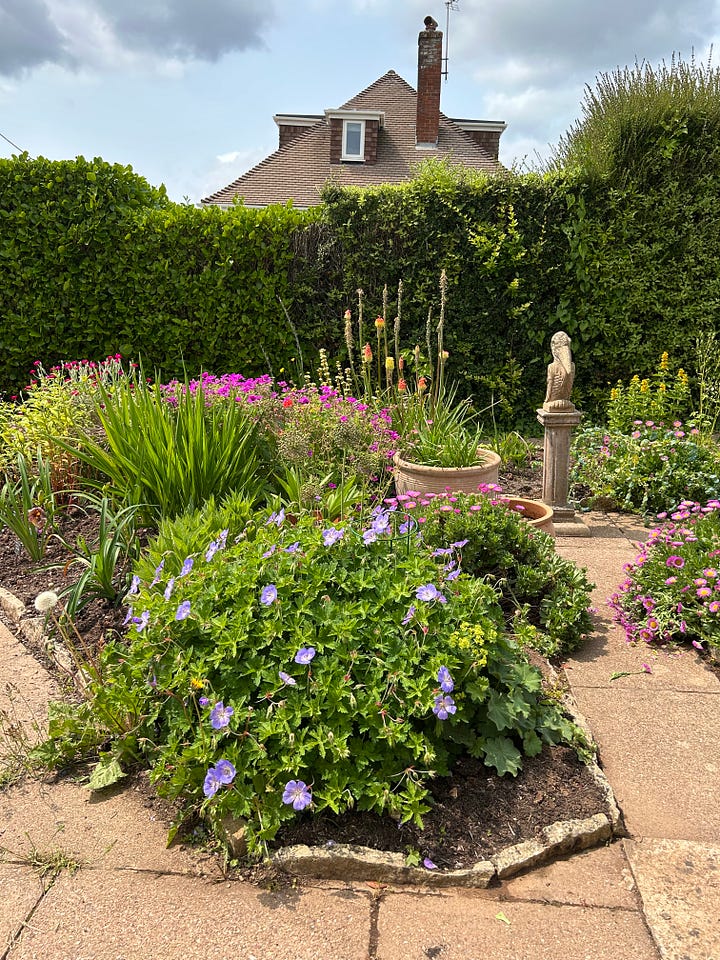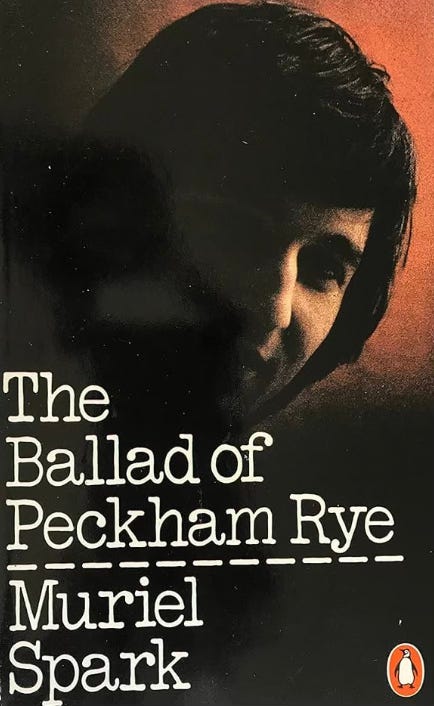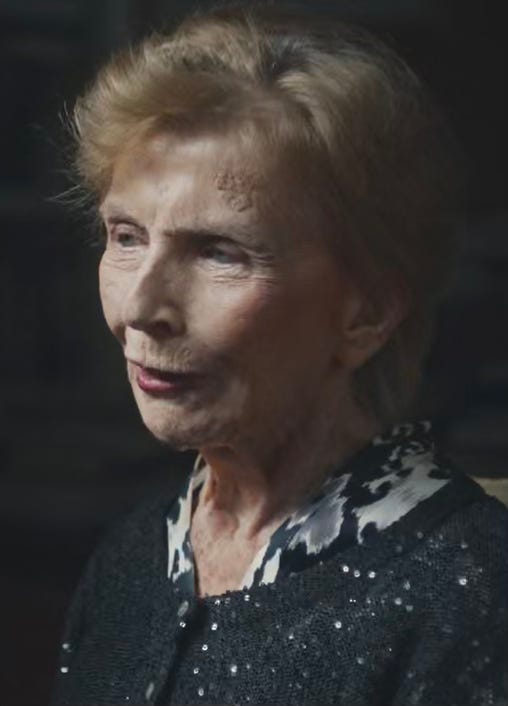Hi everyone, and thank you for your good wishes after my mishap last weekend. Things are much improved and here I am again.
At the end of this month we are having the paving around the house renewed, which is going to take ages and approximate the cost of a small family car. At the moment we are furiously clearing pots from the paving and planting as much as we can into the garden. I use the word ‘we’ in the Royal sense, it’s mostly A because I am not allowed any heavy work after last week while I’m still a bit fragile. Huge pots of ensete, which we have outside the font door in summer, have to go somewhere and there is a lot of juggling going on. Every pot moved reveals another ant’s nest. Surely these are the creatures that will inherit the earth. They are EVERYWHERE. But the garden is coming into its June own and is looking fulsome. Here is a bit of the front garden, and some glorious gazania which survived over winter and are doing splendidly.


This week I read Muriel Spark’s The Ballad of Peckham Rye. It’s very short, a novella really, but one of my favourites. I love the way Dougal Douglas breathes mischievous anarchy into home and workplace(s), upending relationships, creating mayhem in the lives of his acquaintances. Is he accidentally influential for the worse? Or is he really devilish? Are the two bumps on his head where he had horns removed by plastic surgery, as he claims? I doubt it, but he is an arch manipulator of the dull people around him. His disruption ends with his landlady having a stroke, his boss murdering his mistress, and someone being jilted at the altar, and Dougal being attacked. Dougal leaves Peckham to recover, and he doubtless goes on to create chaos elsewhere. It’s funny and wry (no pun intended) and rather overshadowed by her next novel, The Prime of Miss Jean Brodie, considered her masterpiece. I like ‘the ballad’ better.
Last night I watched a film about author Edna O’Brien, who died last year aged 94. I’d recorded it a week or so ago and after supper, with a glass of Laphroig and a little hot water, I thought it would suit my mood. It did. I paid most attention to O’Brien when she was in her prime in the seventies and early eighties – an earthy, russet beauty – outspoken, flirtatious, challenging, and dancing at the pinnacle of cultural high society. I read her books around that time too, (those ‘70s Penguin editions with the naked girls artfully posed on the covers), and bathed in her rich language telling stories about women and love and desire, who didn’t always (in fact hardly ever) have a happy ending. The film, The Blue Road, on SkyArts last week, was a reflection on O’Brien’s life and career. Threaded through it was an interview with the writer, aged 93 – her voice breathy, soft as Irish rain; perfect make-up, black sparkly cardigan, supremely elegant – talking about all aspects of her life, even the most intimate; unrepentant, no regrets. I was not aware of the details of the disaster that was her marriage to Ernest Gébler, and found them chilling. Gébler, a novelist and playwright, was much older and she married against her parents wishes. After the success of her debut novel, The Country Girls, he became outrageously resentful and jealous, trying to take credit for her success (and for her writing) and abusing her emotionally in the most grotesque ways. The film reveals excerpts from her diary (read by the brilliant Irish actress Jessie Buckley) where Ernest has annotated Edna’s entries with vituperative, demeaning comments, written in red. It’s shocking, but also a foretaste of the bullying and misogyny she was to experience for years before her talent and writing were reassessed and fully recognised. The Country Girls was published in 1960 – the Catholic Church ruled Irish life, and the subservient place of women was constitutionally enshrined. O’Brien exploded into this environment – vibrant, defiant, articulate, and glamorous and sexy with it. Her novels about the interior lives of women, explicitly sexual, exposing the repression and damaging expectations on them, were claimed to be a threat to ‘family values’, to morality and even the existing social order. They were banned in Ireland and, some say, burned. The Irish media mocked her, interviews were often prurient and judging. An Archbishop and a justice minister plotted her professional demise, a columnist wrote in a newspaper that he would ‘stick a hatchet in her head’. In the film, the novelist Anne Enright comments: ‘Misogyny is envy with extra dick.’ Apt indeed. And no wonder O’Brien is quoted as saying: ‘The Vote means nothing to women. We should be armed.’
Anyway, if you can access it, do watch. It is rich and moving and generous. Yes, it still says more about her glamourous life in London and New York than about her writing; the famous lovers/liaisons – Robert Mitchum, Brando, Richard Burton and a hint at an affair with a major politician; the international jet-set friends: Jackie O, Mick Jagger, Sean Connery, Princess Margaret, Judy Garland, Shirley MacLaine et al; the making and losing of a fortune - who could resist revisiting that? But there are readings from her books, discussions of their impact, TV clips, interviews with those who knew her including her two sons, and throughout there is Edna O’Brien herself, her aged frailty just the latest iteration of a life of exposed vulnerability. I loved it. O’Brien died not long after the making of the film in July 2024, aged 94. She is buried on Inis Cealtra, also known as Holy Island, off the western shore of Lough Derg, in County Clare, Ireland. May she rest in peace.
Enough for this week. Spark and O’Brien, two giants of literature. You all take care, and I’ll write again soon. x









Good to know you are better. Yes, ants rule the world don't they?
Muriel Spark and Edna O'Brien - 20th century giants. Thank you for the wonderful portrait of the latter.
Loved this post June, thank you. Pleased you are feeling better